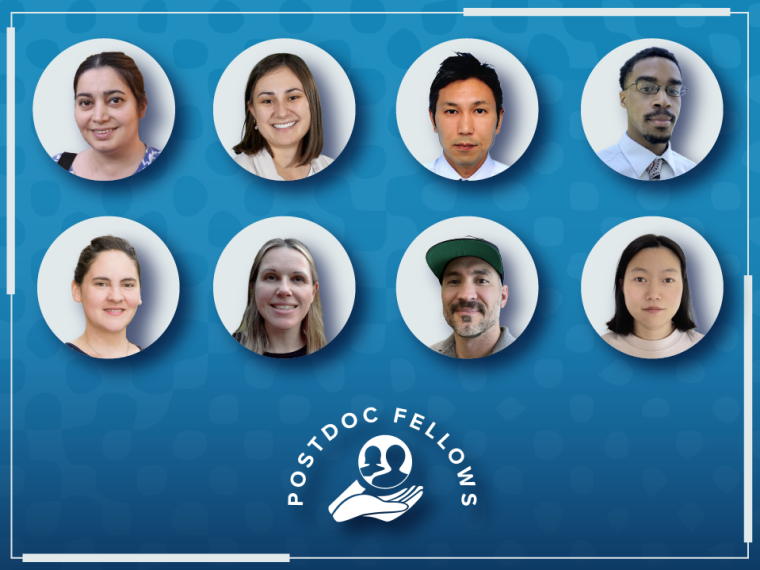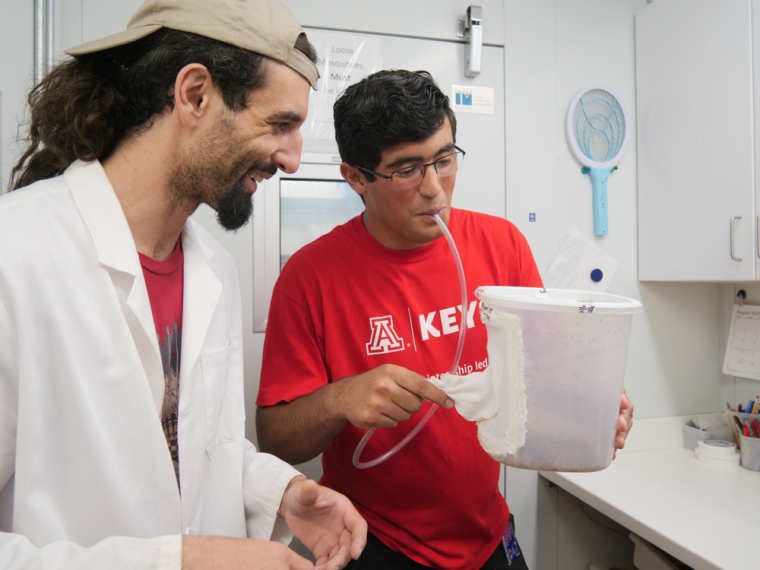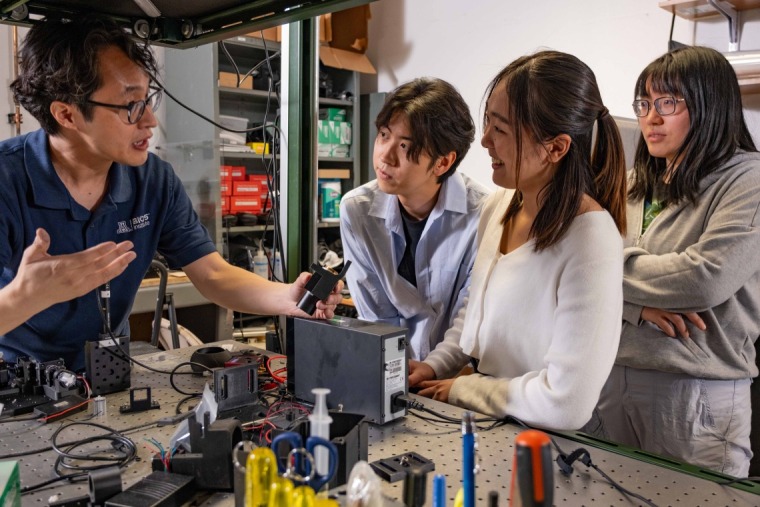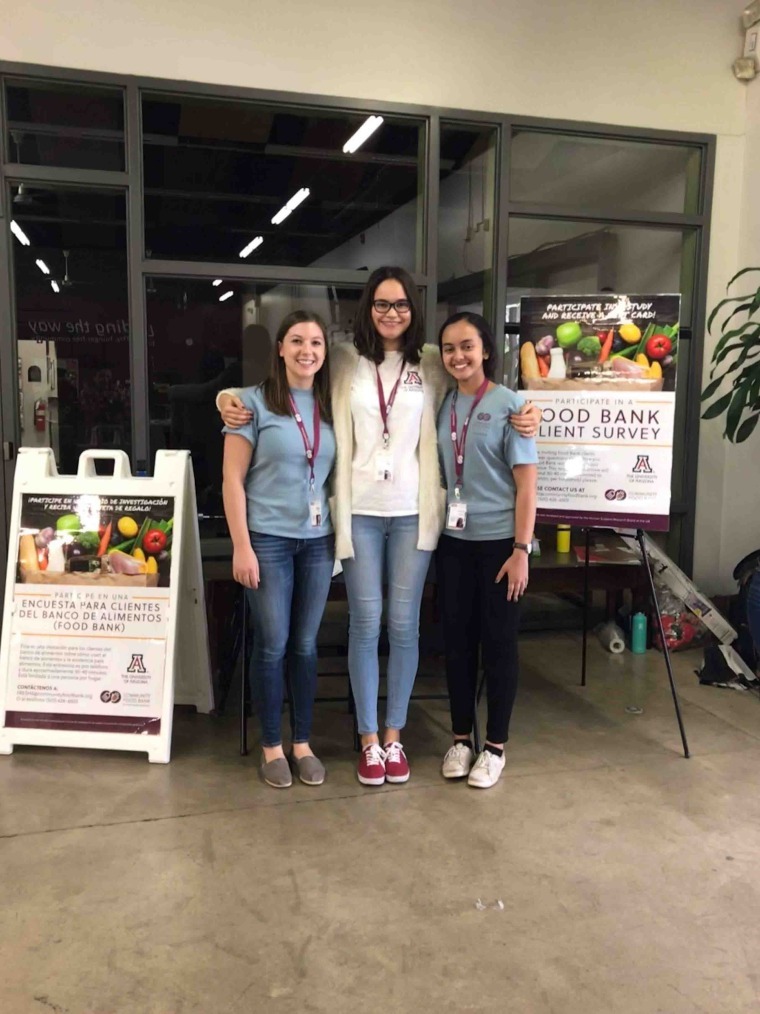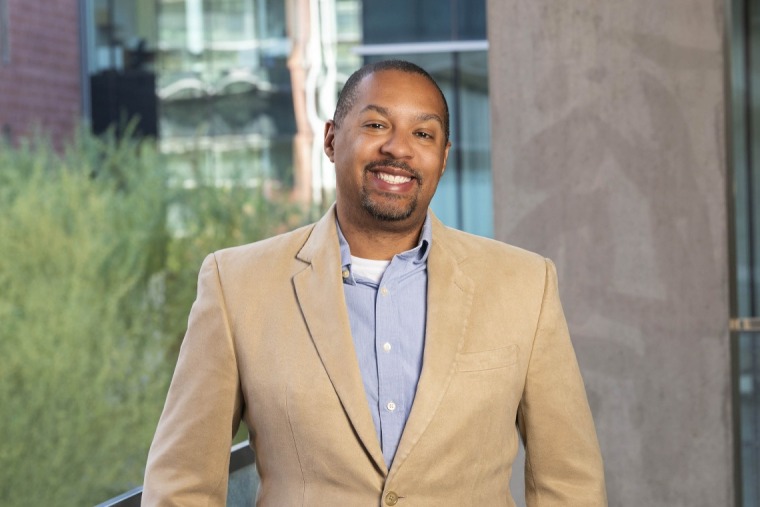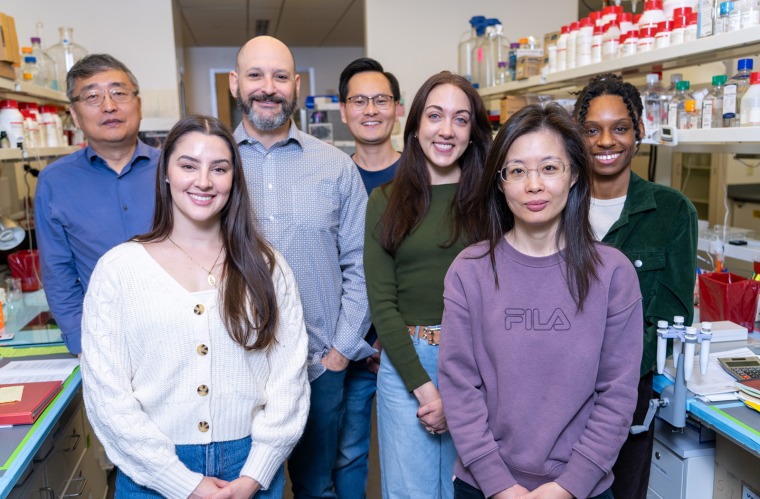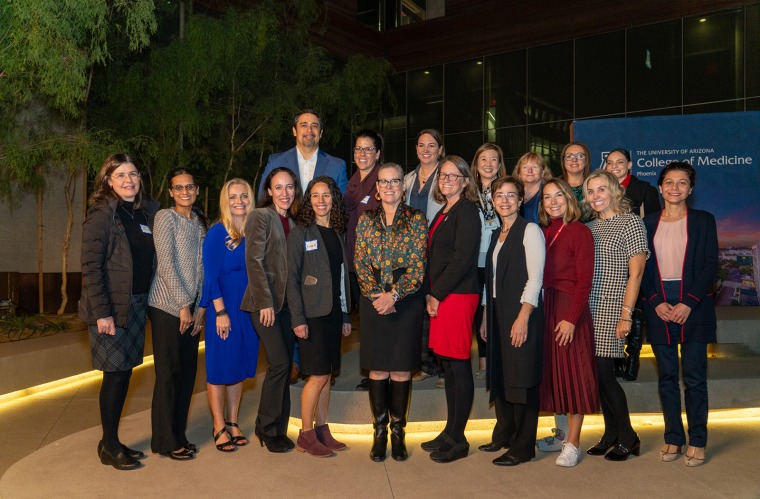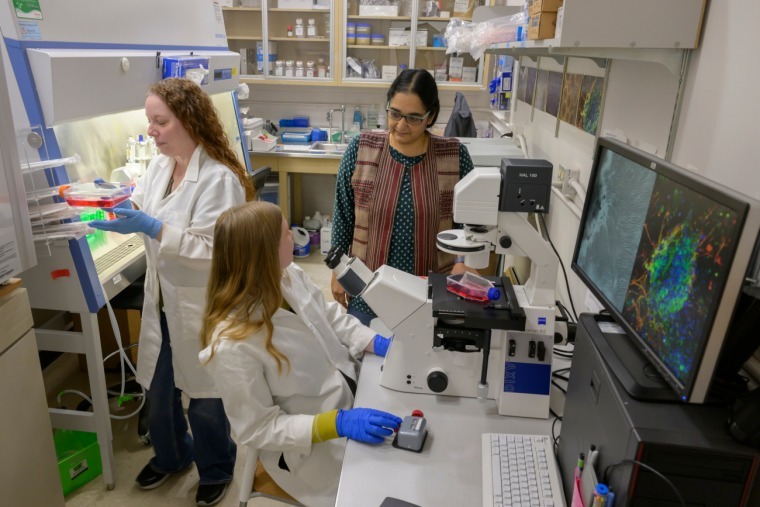From KEYS to cancer research to pharmacy
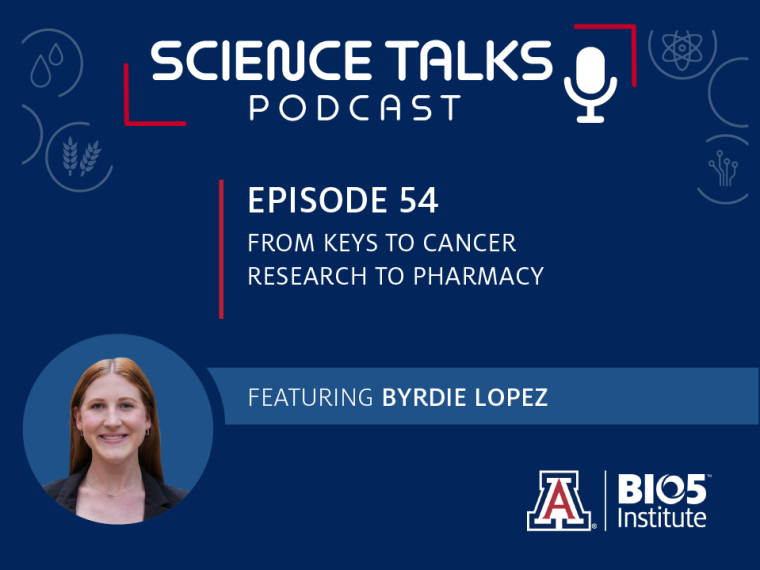
Amy Randall-Barber and her co-host, Paulina Garza, welcomed Byrdie Lopez to the latest episode of Science Talks. Lopez is a University of Arizona undergraduate pursuing a double major in biochemistry and molecular cellular biology on track to attend pharmacy school. Her journey at the BIO5 Institute began as a KEYS Research intern in 2022 working with BIO5 member Wei Wang in the R. Ken Coit College of Pharmacy. Only a few years later, she is a student assistant with KEYS, conducting outreach to local high schools, and diving deeper into investigating how chemistry can help cancer patients.
Let’s start off with rapid-fire questions. What is your favorite type of weather?
A subtle rain with a little bit of rolling thunder in the background and a couple strikes of lightning.
Would you rather be able to speak every language in the world or be able to talk to animals?
I would say speaking all languages because it eliminates communication barriers and opens endless possibilities for connecting with people.
Do you know any other languages?
I am proficient in Spanish, but I would love to become fluent, especially living near Mexico. The Mexican culture in Tucson is vibrant!
If you could travel back in time, what period would you go to and why?
I would go back to the 80s, specifically 1985. That year Live Aid was a massive concert event that captivated the world. It was a fundraiser to help starving children in Africa, and so many artists participated for free, donating all proceeds to charity. Queen was also there, and I would have loved to see Freddie Mercury perform.
I have some knowledge about science, but not a lot. I've always been curious about how science students begin their journey and what inspires them to study science. Was your interest in science something you discovered in college, or did you realize it earlier in your journey?
Since I was young, I have always been curious about the world around me. I participated in science fairs and enjoyed science classes, constantly asking questions.
However, it was in high school when I had an exceptional chemistry teacher, Dr. Rita, who ignited my passion for chemistry. Her enthusiasm resonated with me and fueled my desire to explore chemistry and biological systems.
Science has always been a part of me, but it was in high school that it became a significant focus in my life. I am just so grateful to have had her as a teacher because that really impacted me and where I am today.
You were an intern in the KEYS program back in 2022. Can you tell us about the advantages of being accepted into such a prestigious program in high school and what it meant to you, especially now as a student at the University of Arizona?
The KEYS program is incredibly influential.
As a part of it, you join a select group of individuals deeply immersed in science and research. Networking is a major advantage. You interact with principal investigators, postdocs, and graduate students, fostering a love for research and science. These connections can help you throughout your life, starting at a young age.
Personally, what I love about KEYS is the realization of the impact of research. It drives future science, potentially leading to groundbreaking discoveries like curing cancer. KEYS gives high school students early exposure to research, showing them its significance and how it shapes the future.
Since each intern is matched with a mentor. Who was your mentor, and what was the nature of the lab's work?
My mentor is Mengyang Chang in Dr. Wei Wang's lab in the College of Pharmacy.
Our lab specializes in cancer biology or chemical biology, covering various aspects like chemical assays and biological experiments related to proteins, with a particular focus on cancer research.
What's interesting about our lab is that we have both a chemical and a biological side. Half of the team works on chemical reactions and research, while the other half focuses on biological aspects like growing cancer cells, making proteins, and imaging different cells. My mentor guided me more towards the biological side, allowing me to work with cancer cells, create proteins, and conduct chemical tests on them. It's been enjoyable working in this research lab.
What specific cancer types could benefit from the discoveries made in the lab?
During my research project, we focused on a specific chemotherapy agent called ARV 771, which is FDA-approved. Our aim was to investigate its effectiveness against a particular type of cancer known as senescent cancer.
Now, there are two main types of cancer: normal cancer and senescent cancer. Normal cancer cells are actively dividing and mutating rapidly, posing a significant threat to the body. Chemotherapy is often used to target and eliminate these rapidly growing cancer cells. However, senescent cancer cells are those that have survived chemotherapy but have become mutated and irregularly shaped, making them resistant to traditional chemotherapy drugs.
In our research, we aimed to explore whether ARV 771 could effectively target these challenging senescent cancer cells. As a model, we used lung cancer in our lab. While lung cancer was our primary focus, the discoveries from our research could potentially impact various other types of cancer as well.
Did you achieve any promising outcomes, and what actions did you take afterward? What were the subsequent steps in your research process?
It was incredibly exciting! I had the opportunity to work directly with lung cancer cells and administer the drugs to each dish. The results were astounding – we found that the drug was highly effective in killing the lung cancer cells. It was truly exhilarating to see such impactful results firsthand.
I think this will be included in a research paper that my mentor, Mengyang Chang, is currently working on. This will be just one aspect of the drug we were investigating, contributing to a larger paper.
I am excited to see how this chemotherapy progresses and if it benefits people, which would be incredible.
What was the most memorable aspect or highlight of your experience as a KEYS intern?
I absolutely adored every moment in KEYS. It was incredible to connect with high school students from all over Arizona who shared the same passion for science. That was my kind of crowd, and we instantly clicked.
But in the research lab, my favorite memory was when we made peptides. It is not something many people get to do, and we are one of the few labs with this specialized machine. This machine costs around 300,000 and 400,000 dollars, which is about the price of a house.
So, making peptides is like creating proteins, with 20 bottles representing the 20 amino acids needed to make a protein. You input the amino acid sequence into the attached computer, press start, and around 24 hours later, you have a peptide. There is a whole chemical process involved in releasing the peptide from its casing. It is just fascinating to see how you can input commands on a computer, and out pops a peptide. It is truly mind-blowing. And the process of putting powdered amino acids into liquid form and then into the machine to assemble the peptide was just so cool and fun to be a part of.
Could you share how your experience in KEYS has impacted your current academic or professional journey?
KEYS has had a profound impact on me. Academically, it has equipped me with invaluable skills like science literacy, which is crucial for explaining research to anyone, from young children to colleagues in the lab. This skill is particularly important for my aspiration to pursue pharmacy.
KEYS has boosted my confidence immensely. Before the program, I was timid, just trying to get through high school. But being immersed in research, learning hands-on techniques, and delving into cancer studies, I gained so much. Now, I feel empowered and ready to tackle whatever challenges come my way, especially as I move forward into college and beyond. KEYS is truly an amazing program.
What is your major at the University of Arizona?
I am double majoring in biochemistry and molecular and cellular biology and minoring in pharmaceutical sciences. However, it gets a little bit complicated because I am a sophomore, and I applied for the university PharmD program. I just got accepted, and I am so excited!
So, I am going to be focusing on the PharmD aspect. I will not actually be pursuing my bachelor's; I will be shifting directions towards my Doctor of Pharmacy. That is my goal. It starts in fall, and I will be in the class of 2028.
Did you always plan to attend the University of Arizona, or were there other schools you considered during high school? Did your experience with KEYS influence your decision-making process?
The University of Arizona was always my top choice. In high school, my passion for science and chemistry led me to prioritize being at a school where research is paramount. UArizona ranks in the top 10 for research, holding the fifth position in funding, which was incredibly important to me. Even before KEYS, I knew UArizona was the place for me.
When did you start working as a research assistant? Did you remain in Dr. Wang's lab, or did you explore other lab opportunities?
After completing the KEYS program, I was eager to continue working in Dr. Wang's lab because I had such a wonderful experience there.
Initially, I volunteered for a semester, and then I transitioned to receiving academic credit for my work. Later, during the next summer, my PI allowed me to become a research assistant in the lab. It was an incredible opportunity, and I even had the chance to contribute to some of my own research ideas and participate in projects, including a mice model study focused on our cancer research.
So, have you had the same mentor in the lab this entire time?
Yes, I have. My research mentor during the KEYS program was Mengyang Chang. He is still pursuing his PhD in biochemistry at the University of Arizona. He was phenomenal, guiding me both academically and in research. While I am no longer in the lab, he was a great mentor for the year and a half I spent there.
Could you share with us an exciting or revealing moment that happened recently in the lab?
I am not active in the research lab, but I keep up with what is going on. We had a research paper published in the fall of 2023. It was exciting because I contributed to that research, so they included my name on the paper.
Also, they are publishing a paper on my KEYS research. I mentioned this earlier, but the paper is currently under review, and my name is also listed on that paper. It is incredibly exciting to be a part of that.
So, we have these two papers in the works, plus my research lab was recognized with a reward by the Arizona Cancer Center.
Going back to the conversation about pharmacy school, have you always wanted to pursue a career in pharmacy, or were there other fields you considered exploring?
So, originally, I was into interior design, watching HGTV shows like "Flip or Flop" and "Christina on the Coast". It was more of a hobby. But as I got deeper into science, especially in high school, I realized that is where my true passion lies. Plus, having health professionals as parents nudged me towards healthcare.
Pharmacy stood out because of my love for chemistry and the desire to help people understand their medications better. Patient education is crucial, and I want to contribute to making that process clearer and easier for everyone.
What do you hope to accomplish by the end of your academic career?
By the time I finish my academic journey, my goal is to become a pharmacist, with a specialization in oncology.
My interest in this field was sparked by my cancer research during my time in the KEYS program, particularly focusing on senescent cancer. I envision myself not only practicing as an oncology pharmacist but also staying connected to research. Research is paramount as it shapes the future of medicine. As a pharmacist, it is crucial to stay informed about emerging treatments and advancements. Therefore, I aspire to not only work in oncology but also contribute to research endeavors, staying abreast of developments in the field.
ARB: I am going to ask a question that might seem a bit silly, but I want to clarify. When people typically think of pharmacists, they often imagine someone working in a place like Walgreens. However, I'm curious about the type of pharmacist you aspire to be. What exactly would your role entail, and where would you envision yourself working?
There are several types of pharmacists.
You have those who work in commercial settings like CVS or Walgreens, and then there are clinical pharmacists who are based in hospitals. These clinical pharmacists might specialize in areas like the intensive care unit or the emergency room, where they are available to assist doctors and nurses with medication-related needs.
Personally, I am drawn to the oncology side of things. So, I envision myself either working in a hospital, doing clinical rounds, and providing oncology expertise, or having my own practice where I can directly see patients for oncology consultations.
Do you plan to pursue residencies and similar opportunities to further your career?
I have a deep passion for education, and I’m committed to continuously expanding my knowledge to become an exceptional pharmacist. In fields like medicine and pharmacy where advancements occur rapidly, staying at the forefront of knowledge is crucial. I’m open to pursuing residencies, obtaining additional degrees, or engaging in any other opportunities that will enhance my skills and enable me to better serve the community as a dedicated professional.
As an alum now involved with the BIO5 KEYS team, can you share how your transition into helping prepare and execute the next internship has been influenced by your experience? Has being an alum made this transition easier, harder, or more exciting?
My experience with KEYS has had a profound impact on me, and I'm incredibly passionate about the program. I resonate so deeply with its values and everything it stands for.
Returning to the KEYS team is something I was eager to do because of this passion. Having gone through the program myself, I have gained valuable insights and skills that I want to share with future interns. Seeing them light up as they experience research firsthand and gain a new perspective is incredibly rewarding for me, knowing the lasting impact it can have on their lives, just as it continues to impact mine.
What valuable lesson did you learn during your internship that you hope to impart to future KEYS students?
Before joining KEYS, I doubted my abilities and wondered if I could handle the program's demands. It felt overwhelming, considering the prestigious nature of KEYS and the research responsibilities involved. However, I learned that KEYS provides comprehensive support regardless of your background. They equip you with the necessary knowledge, training, and resources to succeed, starting from the basics.
Regardless of your prior experience or coursework, KEYS ensures that you have everything you need to excel. It is a truly inclusive program that values learning and science more than anything else, and it is incredibly empowering to realize that anyone, regardless of their background, can thrive in KEYS.
Apart from your mentors in KEYS and your current lab, are there any other mentors who have significantly influenced your journey to where you are today? We have discussed your high school teacher and your lab mentor, but are there any others you would like to acknowledge?
It is difficult to pinpoint just one person who has influenced my journey because my family, teachers, and everyone I have had relationships with have shaped who I am today. My teachers played a crucial role in imparting knowledge and skills that I rely on. Additionally, my significant other has been a pillar of support in various aspects of my life. Everyone I have encountered has contributed to my growth and development.
We like to ask everyone this question: What is your "why"? While we may have uncovered aspects of it throughout this interview, is there anything else you would like to share about what motivates you and keeps you going in science?
I think my goal, especially in my career and with all my scientific knowledge, is simply to make an impact. I want to contribute to pharmacy, science, and research in all aspects of my life. I want to make that impact and help future generations. There is so much hope out there, especially with research and all the brilliant minds working on it. I believe we can do it.
Thank you so much for coming and talking with us today. It was an absolute pleasure. And it was great to get to know you.


